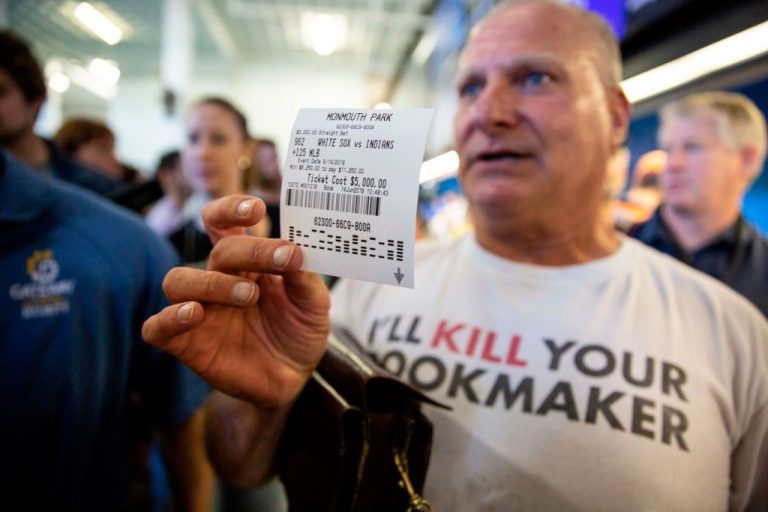As betting on the outcome of professional sports has become both mainstream and easily accessible via a cornucopia of gamified apps, what has proven to be a windfall for both the books and state governments has extracted a significant toll on young men who find themselves taking the worst of their wagers.
In a March 22 article by Newsweek, the outlet stated that since a landmark 2018 Supreme Court ruling opened sports betting to the American public, the industry has seen significant growth.
Yet, the outlet states that the biggest boom may have come over the last 12 months. The NCAA college basketball tournament, which saw 45 million people bet $3.1 billion in 2022, is expected to have 68 million Americans wager more than $15 billion this year by the time the tournament ends.
For example, a March 13 infographic by Visual Capitalist showed that some states, like Virginia, Indiana, and Michigan saw amounts between $4.5 and $4.9 billion wagered in 2022 alone.
All three states are home to 10 million people or less.
Success
You are now signed up for our newsletter
Success
Check your email to complete sign up
The figures, as massive as they are, are even more notable, Visual Capitalist states, in light of the fact that Florida, Texas, and California—America’s three most populous states—have yet to legalize sports betting.
According to the American Gaming Association, which Newsweek consulted for the article, the expansion is attributed to online sports betting, as advertisements for platforms and apps now litter virtually every televised professional event with approximately $1.8 billion being spent nationally on celebrity-focused campaigns, according to one industry group interviewed.
Newsweek cited a National Council on Problem Gambling (NCPG) interview with Pew Research as stating that the “risks for gambling addiction overall have grown 30 percent from 2018 to 2021, with the risk concentrated among young males 18 to 24 who are sports bettors.”
The NCPG put it into perspective, stating that calls, texts, and chats to a gambling addiction helpline run by the group saw a 43, 59, and 84 percent increase respectively.
The Council likewise noted an enormous spike in inbound volume to their helplines in states which had just legalized sports betting. Massachusetts saw a 276 percent increase since 2020’s legalization, Virginia saw a 387 percent increase in its first year, and Illinois was up 425 percent between 2020 and 2022.
Newsweek cited experts who warned that for bettors as young as 18, the danger was developing a habit in their developing brains and psychologies that would form patterns stubbornly resistant to removal later in life.
The outlet stated in a secondary article on the topic that danger signs that are often exhibited in gamblers developing problems include “sharp mood swings related to betting or lying to hide the extent of gambling,” “spending increased amounts of money or time on betting to get the same emotional high,” and, “trying to cut back or stop gambling without success and experiencing financial problems related to wagering.”
And it seems that the books understand the nature of both the boom and the calamity. Newsweek says that the advertising spend is because companies are aware that once the boom bankrupts the new money entering its industry, only a few big players will remain standing, according to experts.
March of 2022 data published by the American Gaming Association stated that Q1 alone printed $14.31 billion in commercial gaming revenue across the entire country, a figure that included brick and mortar casinos and horse racing.
And the print was a record, eclipsing Q4 2021’s figures, which the AGA noted were the industry’s “best start to a year on record.”
Just March alone saw the gambling industry take more than $5.3 billion out of the U.S. economy.
The problem isn’t limited to gambling in the form of sports betting. An April of 2022 analysis published by the London School of Business found that retail stock speculators lost almost $5.3 billion playing the options market despite trading during the biggest bull market on record, specifically on companies like Gamestop, which are notoriously pumped and dumped on social influencing website Reddit.
In July of 2022, data from multiple sources emerged that found Americans had taken out payday loans and burned through credit cards in order to speculate on cryptocurrency during the market’s boom in 2021.
Perhaps these factors are contributing to a problem reported by pawn shops in both the United Kingdom and United States in 2022 wherein people had taken to fencing their valuables in order to pay for groceries and gas as the economy tightened.
2023 opened with the ominous news that the personal savings rate had, by the end of 2022, fallen to the lowest level since 2005.
However, a deeper dive into data distributed by the Federal Reserve showed that while the upper and middle classes had remained mostly unaffected, the lowest 20 percent of earners were the ones being wiped out.
















